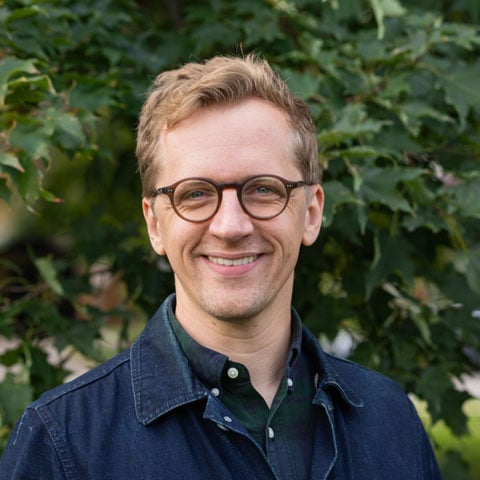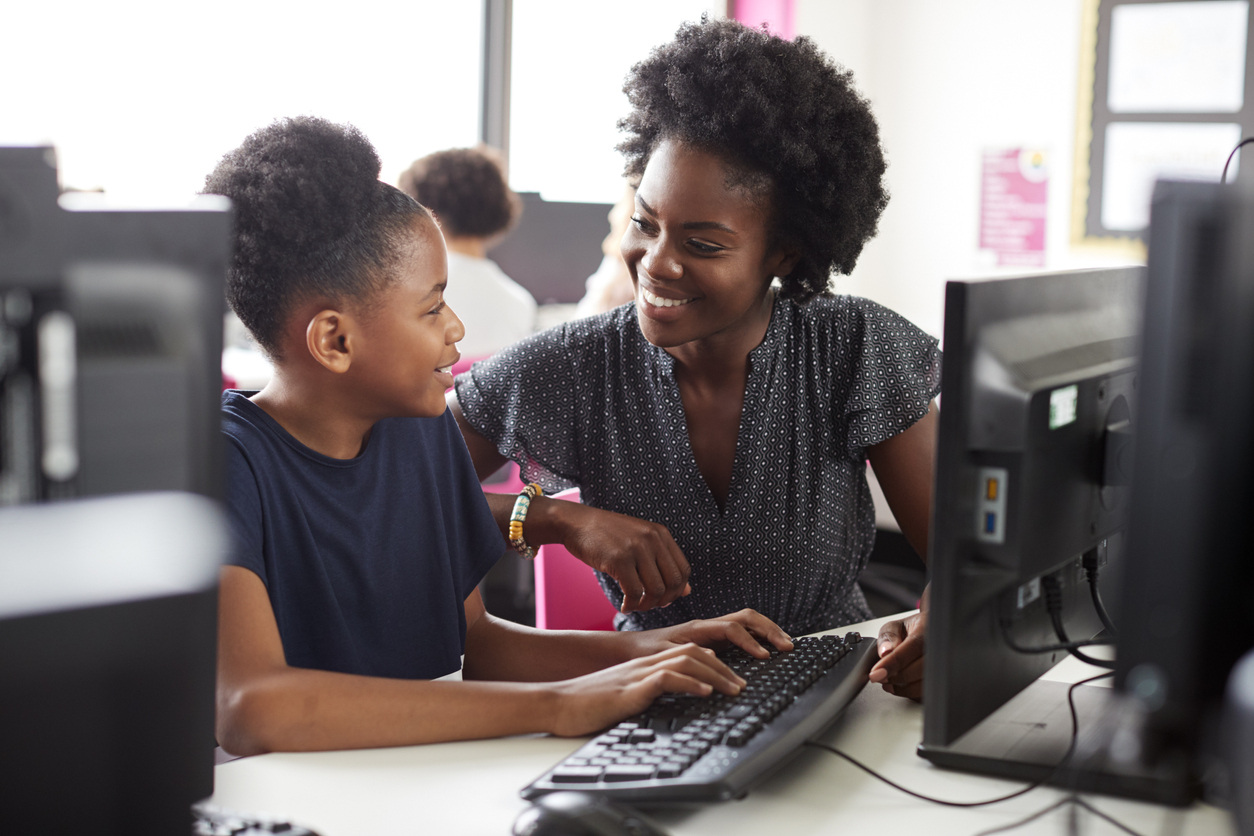Blog
Search Institute Spotlight: Meet Michael Wright
As Senior Learning Experience Manager, Michael Wright helps ensure that Search Institute's various projects and initiatives are consistent and memorable learning experiences. In this Spotlight, he shares how his diverse skill set informs his work, how Search Institute’s solutions are built on youth voice, practitioner wisdom and research, and what’s on the horizon as we continue to create learning experiences that build capacity to support youth thriving.
Through our professional learning experiences, Search Institute builds capacity and inspires change to support youth thriving. As Senior Learning Experience Manager, how does your past experience inform how you approach this work?
My past experience has spanned multiple sectors—higher education, communication and marketing, and instructional design—and I bring all three of these lenses to my work at Search Institute. I’ve taught courses for many years, exploring humanities, art history, communication, composition, and similar topics. As an online editor for a graduate school, I helped shape the institutional voice across social media, newsletters, podcasts and a print magazine. As a designer, I’ve built courses for professionals looking to build skills and deepen their knowledge. While the work has varied, it all has in common my interest in helping institutions use digital tools and in-person experiences to help adults learn and grow. It feels a bit like translation, looking for connections across knowledge domains that can support human flourishing, and it resonates deeply with Search Institute’s focus on development, from young people to the adults who care for them.
Another way to say this is I’m constantly asking three questions: What do we want people to know? How are we communicating it? What can we design to support that effort? Our learning experiences are most effective when we can answer these three questions with clarity. Reflecting on what we want people to know means we think carefully about adult learning principles and reducing cognitive load just as much as we consider the ideas themselves. When we reflect on how we’re communicating, we look carefully at our research and make sure we’ve adequately translated it into practitioner-friendly words, supported by stories and language from their own communities. And when we reflect on the design itself, we try to make the best possible choices about digital tools, page layout, and user experience that ultimately get out of the way of the learning itself.
On the day to day, all of this looks like designing sitemaps for toolkits so they’re easy to use, carefully designing data visualizations so that the imagery supports the interpretation, meeting with partners to make sure we understand their needs just as much as what they want to learn, and experimenting with new ways to use the best of in-person and virtual experiences to help empower our partners with our decades of research.
How do practitioner wisdom and lived experiences inform the creation and continuous improvement of our solutions?
The first thing that comes to mind is how we start every workshop and webinar. We always share that Search Institute exists at the intersection of research, youth voice, and practitioner wisdom. So we name it. We remind everyone from the very beginning that we can’t exist with the work of the people we support, that we don’t just translate research to practice—we let practice inform what and how we learn. It reminds me of Peter Block from Community: The Structure of Belonging where he says the “small group is the unit of transformation and the container for the experience of belonging.” He describes social transformation as the natural outcome of a small group of caring adults gathering together to imagine a new future together. This parallels the same shift toward co-design and participatory research methods. We don’t stand outside our partners, we work alongside them in dialogue. We bring research and data and tools and resources and learning objectives, and they bring the lived reality of working with young people. The future emerges through collaboration—our solutions and research supporting and blending with their own lived experience and community wisdom.
We aren’t on a youth soccer field in Minneapolis, we aren’t in the hallways with students in Pasadena. We do tested and validated research; we design what would help students thrive in after-school programs in Dover, or what families in San Antonio need to thrive. But we do know our tested and validated research. And we do know partners in these spaces doing the work, and when their histories and relationships and longings for the future meet our research, new insights occur every time. We plan for it (and we plan carefully!) but we don’t control it. The wisdom emerges in the experience itself.
Another thing that comes to mind is our increased emphasis on contextualization as we design our learning experiences. We respect our partners’ work and wisdom, since their day-to-day reality is where youth development actually happens. Practically, that looks like quoting their own young people in our workshops when we can. For example, when we conducted a workshop for Girl Scouts, we included clips from interviews with their own young people as a way to celebrate their ongoing work, and point out where developmental relationships are already showing up in their setting. It also looks like aligning carefully with leadership vision and language. When we led a series of workshops at a school district in Inver Grove Heights, MN, we made sure we understood the district's plan for the year, the language the leaders were using, and the professional development path of their educators—and we adapted accordingly. It also looks like using case studies from within the community whenever possible. Considering context can go a long way. It’s all part of a translation effort—aligning our research and resources with the life worlds of our partners—so that our frameworks are as effective as possible from the first moment. We’re building bridges to our research in real time.
Finally, we’re continuously gathering feedback from trainers and participants, and adjusting as we go. We want our work to be as effective as possible, and that means deep listening, experimenting, and always, always, always keeping the ultimate goal in mind: building the capacity for adults as they help young people thrive.
Search Institute recently rolled out new workshops focused on Developmental Relationships. Can you share the approach to these new workshops and how they support educators and youth-serving practitioners, the young people they serve, and their organizations?
We’ve rolled out four newly designed learning experiences: a short overview of developmental relationships (delivered as a live workshop or self-directed learning), a workshop on how we build relationships as individuals (using our Developmental Relationships Framework), a workshop on how we work together to build relationships in our setting (using our Rooted-in-Relationships Model), and a series of “boosters” (short sessions focused on individual elements of Developmental Relationships) coming soon.
The content is based on Search Institute’s landmark research on Developmental Relationships, but we’ve updated the approach in a few ways. The workshops have an increased focus on drawing out practitioner wisdom and action-oriented steps. The content and activities carefully build over time, helping participants build practical next steps for their own context. The workshops lean into community wisdom and feature new activities that help participants learn from one another. We’ve also heard loud and clear that partners want more in-depth learning opportunities on elements of Developmental Relationships, so we’ve designed the new “boosters” to meet the need. We’re also emphasizing a modular approach—all three pair well together, but they also exist independently of one another. It’s laid the groundwork for partners to choose what best meets their needs.
We also built these learning experiences so they more seamlessly integrate into other Solutions and Research partnerships. We can deliver workshops to ground school and district leaders in our frameworks before implementing our Developmental Relationships Survey. We can deliver follow-up “booster” sessions as a follow up to help staff reflect on how to most effectively build a single element of Developmental Relationships. And we’ve adapted the content to be delivered at several conferences to meet the needs of coalitions of youth-serving organizations. As we refine these learning experiences, we’ll continue to be more nimble and responsive to the needs of the people we serve.
Now that these new workshops have been released, what’s next for learning experiences in Solutions?
Now that we’ve re-designed these new learning experiences, we’re bundling them together so partners at national organizations can become certified trainers through Thriving Through Developmental Relationships. This new, training of trainers program blends the best of self-directed learning, in-person training, and ongoing support through a virtual community of practice. We’ve developed it through deep listening with national partners, and I’m particularly excited about our cross-sector approach. The virtual community of practice will include voices from various national organizations who can support and learn from one another as they use these workshops to cultivate developmental relationships in their own communities.
All of this effort also frees us up to be more experimental. We’ve designed these learning experiences to be modular, which will help us in the future when we need to respond to partner needs with a more customized experience. I’ve also been planning new, shorter virtual sessions that meet partners right in the flow of work. Our youth development experts can be thought partners to dialogue with in real time. We are also updating workshops focused on Developmental Assets, based on what we’ve been learning. I tell people Developmental Assets are nouns and Developmental Relationships are verbs—our core frameworks work naturally together, and I’m excited to design new learning experiences that blend them together in new ways.
What creative endeavors do you pursue outside of Search Institute?
Outside of work, I love wandering the library or museum and following my curiosity. Recently, I’ve been reading about socially-engaged art, rhetoric, interior design, American history, leadership development…There’s so much to learn! I’m also regularly writing about the intersections of art and creative life through my weekly newsletter Still Life and curating a monthly art and culture calendar to cultivate new connections among local artists and leaders. I love exploring the Twin Cities with my wife, bookbinding, talking into the night on our porch with friends, debating in book clubs, and taking long walks through the neighborhood.
During his time with Search Institute, Michael has supported multiple projects, and collaborated on a number of resources and tools, including the DR+Math Toolkit, Student Voice to Student Outcomes, Spiritual Thriving in African American, Latino/Hispanic, and Low-Income Families: Reimagining Messages and Tools for Change and CADRE. In his role as manager of Search Institute's professional learning experiences, he develops and delivers workshops, webinars, training-of-trainer programs on Developmental Relationships and Developmental Assets, and more.



